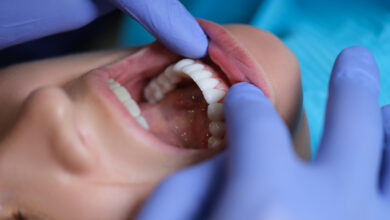Masseter Botox: A Solution for Teeth Grinding and TMJ Disorder

Are you waking up with a sore jaw or suffering from the debilitating effects of teeth grinding and TMJ disorder? Look no further – we have the perfect solution for you! Introducing Masseter Botox, an incredible non-surgical treatment that can provide much-needed relief.
Say goodbye to uncomfortable nights and hello to a pain-free life! In this blog post, we delve into everything there is to know about Masseter Botox: its benefits, procedure, and how it can revolutionize your dental health. So sit back, relax, and get ready to discover the key to unlocking a tension-free smile!
Introduction to Masseter Botox
If you suffer from teeth grinding (bruxism) or temporomandibular joint (TMJ) disorder, you may be a candidate for masseter botox. Masseter Botox is a non-surgical procedure that can help to alleviate the symptoms of these conditions.
The masseter muscle is responsible for chewing and is located in the jaw. When this muscle is overactive, it can cause the jaw to tighten and lead to teeth grinding or TMJ disorder. By injecting botulinum toxin into the masseter muscle, the muscle can be temporarily paralyzed, leading to reduced clenching and grinding.
Masseter Botox is a safe and effective procedure with minimal side effects. The most common side effect is temporary weakness of the jaw muscles, which typically lasts for a few weeks after treatment. If you are considering masseter botox, be sure to consult with a qualified medical professional to ensure that it is the right treatment for you.
What are Teeth Grinding and TMJ Disorder?
If you suffer from teeth grinding (bruxism) or TMJ disorder, you know how painful and inconvenient these conditions can be. But did you know that there is a non-surgical solution? Masseter botox can help to relieve the pain and discomfort associated with these conditions, as well as improve your overall appearance. Botox face slimming
What is teeth grinding (bruxism)?
Teeth grinding is a condition that affects many people. It is characterized by clenched teeth and jaw muscle tension. This can lead to headaches, ear pain, and difficulty sleeping. Teeth grinding often occurs at night, but it can also happen during the day.
The condition can be caused by stress, anxiety, misaligned teeth, or an overbite. If you grind your teeth regularly, you may notice that your teeth are becoming worn down or that you have chips in your tooth enamel.
What is TMJ disorder?
TMJ disorder is a condition that affects the temporomandibular joint (TMJ). This joint connects the lower jaw to the skull. TMJ disorder can cause pain in the jaw joint and surrounding muscles. It can also cause clicking or popping sounds when you move your jaw.
The condition is often caused by stress, clenching your teeth, or arthritis. TMJ disorder can be very painful and makes it difficult to eat or speak properly.
Benefits of Masseter Botox for Teeth Grinding and TMJ Disorder
If you suffer from teeth grinding (bruxism) or TMJ disorder, you know how frustrating and painful these conditions can be. Masseter Botox injections can provide relief from these conditions by relaxing the muscles that are responsible for the grinding and jaw pain. Here are some of the benefits of this non-surgical treatment:
1. Relief from Painful Jaw Clenching and Teeth Grinding – If you suffer from bruxism, you know how painful it can be to constantly clench your teeth. This can lead to headaches, earaches, and even jaw pain. Masseter Botox injections can relax the muscles that are responsible for the clenching, providing much-needed relief.
2. Decreased TMJ Disorder Symptoms – TMJ disorder is a condition that causes pain and inflammation in the jaw joint. This can lead to difficulty chewing, joint popping and clicking, and pain when opening or closing your mouth. Masseter Botox injections can help to reduce these symptoms by relaxing the muscles around the jaw joint.
3. Improved Sleep Quality – Bruxism often leads to sleep disruptions due to the constant teeth grinding. This can lead to fatigue and daytime drowsiness. Masseter Botox injections can help improve sleep quality by reducing or eliminating grinding at night.
4. Reduced Stress Levels – Bruxism and TMJ disorder can often be caused by stress. The constant pain and discomfort can add to your stress levels, making
Risks and Side Effects of Masseter Botox
There are a few risks and side effects associated with masseter botox injections that you should be aware of before undergoing treatment. These include:
- Bruising and swelling at the injection site
- Headache
- Temporary facial weakness or paralysis
- Numbness in the injected area
- Muscle weakness
These side effects are usually temporary and resolve within a few days or weeks. In rare cases, more serious complications can occur, such as difficulty swallowing or speaking, infection, and nerve damage. If you experience any of these problems after receiving masseter botox injections, seek medical attention immediately.
How Often Should You Have a Masseter Botox Treatment?
Most people will need to have masseter botox treatments every 3-4 months in order to maintain the results. However, some people may find that they can space out their treatments to every 6 months or even once a year after getting treatment for an extended period of time.
What to Expect During a Masseter Botox Treatment
When you arrive for your Masseter Botox treatment, the first thing our medical team will do is assess your individual needs. We will then discuss the best course of action for you and provide you with an estimate of how many units of Botox will be required to achieve the desired results.
Once we have decided on the number of units, we will cleanse your skin and inject the Botox into the Masseter muscle. The injection process takes only a few minutes and is relatively painless. You may experience some mild bruising or soreness at the injection site, but this should resolve within a few days.
After your treatment, it is important to avoid strenuous activity or rubbing the injection site for at least 24 hours. You should also avoid lying down for four hours after the treatment. Within a week or two, you should start to see a reduction in teeth grinding and TMJ pain. The full effects of Botox can take up to six weeks to appear.
Alternatives to Masseter Botox for Teeth Grinding/TMJ Disorder
There are a number of alternatives to masseter botox for those suffering from teeth grinding or TMJ disorder. These include:
Dental appliances: Wearing a mouthguard or splint at night can help to protect your teeth from grinding and reduce the symptoms of TMJ disorder.
Stress management: Learning how to manage stress can help to reduce the urge to grind your teeth. Relaxation techniques such as yoga or meditation may be helpful.
Diet modification: Avoiding hard, crunchy foods can help to reduce the strain on your jaw muscles and lessen the symptoms of TMJ disorder. Eating softer foods may also be easier on your teeth and reduce the risk of tooth damage from grinding.
Exercise: Strengthening the muscles in your face and neck can help to reduce the amount of tension you feel in your jaw, which can lead to fewer teeth grinding. Simple facial exercises such as smiling widely or chewing gum can help achieve this.
Conclusion
Masseter Botox is an effective and safe non-surgical solution for teeth grinding and TMJ disorder. It can help to reduce both the physical and psychological effects caused by teeth grinding, such as pain in the jaw, headaches, soreness of the jaw muscles, and even difficulty eating or speaking.
If you’re looking for a way to manage your teeth grinding without surgery or medication then this may be just what you need. Speak with your doctor about whether Masseter Botox could be right for you.




